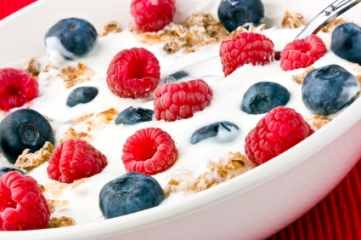Inside each of our muscle fibers lives stored glycogen which gives the muscle fuel to use. Muscles can only store a limited amount of glycogen, so we must constantly replenish our stores by eating. When our glycogen levels are low we become slower, weaker and less able to concentrate. 
Glycogen is made from the food we eat, particularly carbohydrate-containing foods, so it is critical to eat a healthy meal containing ample carbohydrates prior to the game to have the muscle energy need to play.
The meal closest to game time needs to have most of its calories come from carbohydrates, because they convert into energy quicker and more efficiently than other nutrients.
It is also important to include a source of vitamins and minerals with the pre-game meal to help the body transform carbohydrates into energy.
If your child goes to a game or scrimmage without having eaten, he or she will not have the energy to play at his/her full potential. Some players try to down a bagel or a piece of toast a half hour before the game because they have forgotten to eat earlier. If they do this, their body's primary focus during the first half of the game will be on digesting that food. They won't have given their bodies time to transform the food into energy the muscles can use.
Bottom line: A pre-game meal should be eaten about 2 to 3 hours before the game, practice or scrimmage. For good, long-lasting energy the meal should consist of mostly whole grains, cereals, pastas, or breads accompanied by a fruit or vegetable and some protein.
Cynthia Lair is a blogger, author (with Scott Murdoch, PhD, RD) of Feeding the Young Athlete: Sports Nutrition Made Easy for Players and Parents (available on her website and from which this article has been adapted) and the newly revised 3rd edition of Feeding the Whole Family: Recipes for Babies, Young Children and Parents. She is also the host of Cookus Interuptus, a web-based organic cooking show.









